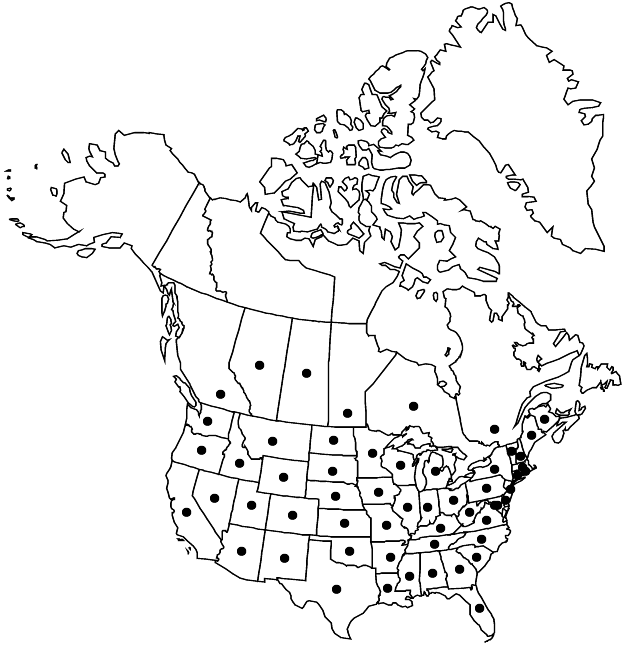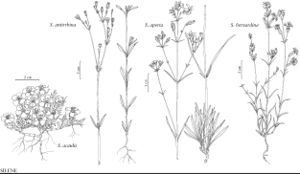Silene antirrhina
Sp. Pl. 1: 419. 1753.
Plants annual; taproot slender. Stems erect, simple or branched, slender, to 80 cm, subglabrous to retrorsely puberulent especially proximally, distal internodes frequently glutinous. Leaves 2 per node; blade with margins ciliate toward base, apex acute to obtuse; basal blades oblanceolate, spatulate; cauline narrowly oblanceolate to linear, 1–9 cm × 2–15 mm, scabrous or puberulent, rarely glabrous on both surfaces. Inflorescences cymose, open, branches usually ascending, several to many-flowered, 1-flowered in depauperate specimens. Flowers: mature calyx prominently 10-veined, campanulate to ovate, 5–9 × 3–5 mm, margins dentate, glabrous, veins parallel, with pale commissures; lobes usually purple, triangular, acute, ca. 1 mm; petals white, often suffused with dark red, rarely wholly dark red, limb ovate, usually 2-lobed, ca. 2.5 mm, slightly longer than calyx, rarely petals absent, claw narrow, appendages 0.1–0.4 mm; stamens included; styles 3; stigmas included. Capsules equaling calyx, opening by 6 teeth; carpophore less than 1 mm. Seeds dull gray-black, reniform, 0.5–0.8 mm diam., finely papillate. 2n = 24.
Phenology: Flowering spring–late summer.
Habitat: Dry, sandy or gravelly places, roadsides, fields, waste places, open woods, often appearing after burning
Elevation: 0-2300 m
Distribution

Alta., B.C., Man., N.B., Ont., Que., Sask., Ala., Ariz., Ark., Calif., Colo., Conn., Del., D.C., Fla., Ga., Idaho, Ill., Ind., Iowa, Kans., Ky., La., Maine, Md., Mass., Mich., Minn., Miss., Mo., Mont., Nebr., Nev., N.H., N.J., N.Mex., N.Y., N.C., N.Dak., Ohio, Okla., Oreg., Pa., R.I., S.C., S.Dak., Tenn., Tex., Utah, Vt., Va., Wash., W.Va., Wis., Wyo., Mexico, South America, adventive in Europe
Discussion
The six varieties and forms of Silene antirrhina noted above were named on the basis of stature and flower color, but none appear to be worthy of recognition. The species is very plastic, being greatly affected by moisture, exposure, and nutrients.
Selected References
None.
